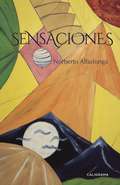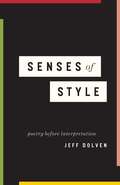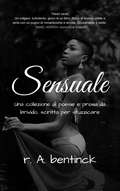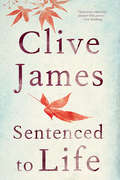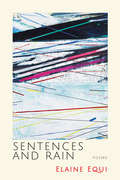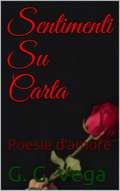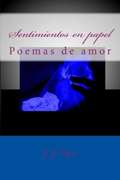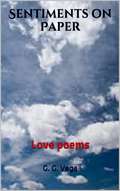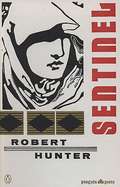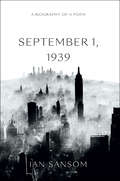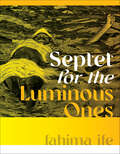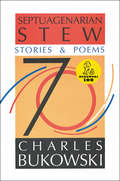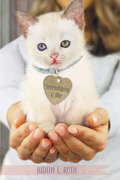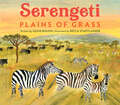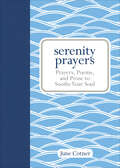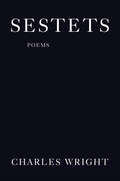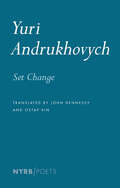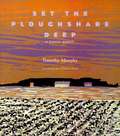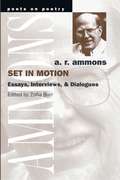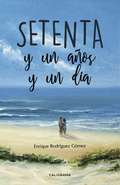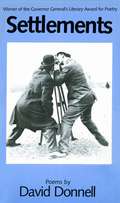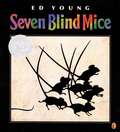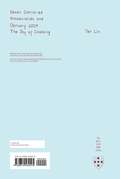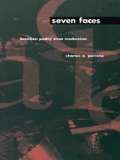- Table View
- List View
Sensaciones
by Norberto AlbalongaSi lees éste hermoso poemario, tan fluido como el agua, no quedará indiferente. <P><P>El poemario está compuesto por una serie de poemas que trascienden la línea de lo meramente poético para engarzarse a todo un rosario de sentimientos y experiencias que hacen de la poesía de Norberto Albalonga un arte estético único. <P>La sabiduría histórica y cultural, así como la amplia temática, hacen de este libro una obra que ahonda en la dificultad de la sencillez donde cada palabra adquiere un significado revelador y emocionante para entregar al lector la verdadera razón del placer de la lectura.
Senses of Style: Poetry before Interpretation
by Jeff DolvenIn an age of interpretation, style eludes criticism. Yet it does so much tacit work: telling time, telling us apart, telling us who we are. What does style have to do with form, history, meaning, our moment’s favored categories? What do we miss when we look right through it? Senses of Style essays an answer. An experiment in criticism, crossing four hundred years and composed of nearly four hundred brief, aphoristic remarks, it is a book of theory steeped in examples, drawn from the works and lives of two men: Sir Thomas Wyatt, poet and diplomat in the court of Henry VIII, and his admirer Frank O’Hara, the midcentury American poet, curator, and boulevardier. Starting with puzzle of why Wyatt’s work spoke so powerfully to O’Hara across the centuries, Jeff Dolven ultimately explains what we talk about when we talk about style, whether in the sixteenth century, the twentieth, or the twenty-first.
Sensuale: Una collezione di poesie e prosa da brivido e da batticuore
by R. A. BentinckL'attrazione non dovrebbe mai essere sottovalutata. Per non perdere gradualmente la sua deliziosa avventura, lucentezza, fascino e magia eterea. Dovremmo cercare costantemente di rivitalizzare i fuochi morenti della passione. Nutri le fiamme del desiderio in un modo che permetta loro di sfuggire al controllo, anche se momentaneamente. In questa raccolta straordinariamente unica di versi e prosa contemporanei, Bentinck ha riunito diversi pezzi diversi che garantiscono di accarezzare il tuo lato seducente. Ti incoraggia a pensare a una persona speciale con desideri irrequieti che ti spingono verso il precipizio della sensualità prima che il tuo limitato autocontrollo si svegli. Sultry celebra con entusiasmo la magnifica bellezza della passione, della tentazione e dell'irresistibile attrazione con creatività e abilità poetiche. In questa raccolta di poesie sono integrati alcuni abili usi di metafore e immagini immaginarie che tenteranno le tue insaziabili fantasie. Alimenteranno le tue voglie insoddisfatte, delizieranno la tua lussuria setosa e susciteranno la tua curiosità sul culmine di un'esplosione avventurosa. Dopo aver completato questa raccolta, ti lascerà il desiderio di esprimere, esplorare e indulgere con quella persona significativa. Troverai la motivazione per perseguire modi sperimentali e creativi per comunicare la tua passione e desideri senza sensi di colpa.
Sentenced to Life: Poems
by Clive James"There is an inevitable sadness to this moving collection. This being James, there are also moments of zinging energy and a sense of fun…James will remain in the present tense as those Japanese Maple's leaves continue to turn to flame." —Rebecca K. Morrison, Independent In this new collection of "technically and emotionally heart-stopping poems" (Spectator)—including "Japanese Maple," which was published in The New Yorker to great acclaim—Clive James looks back over an extraordinarily rich life with a clear-eyed and unflinching honesty. There are regrets but no trace of self-pity in these verses, which—for all their grappling with death and his current illness—are primarily a celebration of what is treasurable and memorable in our time here. Again and again, James reminds us that he is not only a poet of effortless wit and lyric accomplishment but also an immensely wise one, who delights in using poetic form to bring a razor-sharp focus to his thought. Miraculously, these poems see James writing with his insight and energy not only undiminished but positively charged by his situation. The poems of Sentenced to Life represents a career high point from one of the greatest literary intellects of our age.
Sentences and Rain
by Elaine EquiWhether celebrating clones or revising Led Zeppelin, Equi melds verse with aphorism, wisdom with wicked playfulness. "—Entertainment Weekly Equi's poems are under the breath asides from your cleverest friend—witty, thoughtful, and wry. SLIGHT A slight implies if not an insult (real or imagined) at least something unpleasant -- a slight cold, a slight headache. No one ever says: "You make me slightly happy. " Although this, in fact, is often the case. Widely published and anthologized, Elaine Equi's work has appeared in The New Yorker, Poetry, The American Poetry Review, Nation, and numerous volumes of The Best American Poetry.
Sentimenti Su Carta - poesie d'amore
by Guido Galeano Vega Francesca Ruscelloè una serie di poesie sentimentali, nate dalla mia esperienza personale, in una tappa sentimentalmente complicata della mia gioventù. Questo libro è ispirato a sentimenti malinconici ma autentici, in una fase della mia giovinezza, dove ero ispirato da tempi e luoghi diversi, per trascrivere su carta i sentimenti nati o ispirati da belle donne che mi sono piaciute. Sono poesie scritte circa 20 anni prima di essere state pubblicate, in questo momento. Spero sia di gradimento ai lettori.
Sentimentos em Papel
by Felipe Andrei Guido Galeano VegaEste livro é inspirado em sentimentos melancólicos, mas genuínos, em uma etapa da minha juventude, baseados em momentos e lugares distintos, para transcrever para o papel os sentimentos nascidos e inspirados em mulheres lindas que me conquistaram. São poemas escritos cerca de 20 anos antes de serem publicados. Espero que seja do agrado dos leitores.
Sentiments on Paper
by Guido Galeano Vega Lucía VerdejoThis is a small book of poems, inspired by real people and authentic feelings. Its purpose when created was to magnify the sublime feeling of love that awakens in men a beautiful woman. A virtue that men must not lose is the ability to love, comprehend, tolerate, and protect women. For obvious reasons, they are the guides of our existence, which may be good or bad, but is ultimately a unique experience that is priceless and offers us the privilege of existing and living. We owe this to love and to women. Thus, the existence of this humble book of poems.
Sentinel and Other Poems
by Robert HunterHunter's second collection of poetry, Sentinel contains short poems and two extended works: The Sentinel with its seven sections (or "Watches"), and An American Adventure, which constitutes an epic abstract commentary on the Grateful Dead.
September 1, 1939: A Biography of a Poem
by Ian SansomOne poet, his poem, New York City, and a world on the verge of change.W. H. Auden, a wunderkind, a victim-beneficiary of a literary cult of personality, became a scapegoat and a poet-expatriate largely excluded from British literary history because he left. And his poem, “September 1, 1939,” was his most famous and celebrated, yet one which he tried to rewrite and disown and which has enjoyed—or been condemned—to a tragic and unexpected afterlife.These are the contributing forces underlying Ian Sansom’s work excavating the man and his most celebrated piece of literature. But Sansom’s book is also about New York City: an island, an emblem of the Future, magnificent, provisional, seamy, and in 1939—about to emerge as the defining twentieth-century cosmopolis, the capital of the world.And so it is also about a world at a point of change—about 1939, and about our own Age of Anxiety, about the aftermath of September 11, when many American newspapers reprinted Auden’s poem in its entirety on their editorial pages.More than a work of literary criticism or literary biography, this is a record of why and how we create and respond to great poetry.
Septet for the Luminous Ones (Wesleyan Poetry Series)
by fahima ifeContinuing her search for a neotropical mythos, in this brilliant second collection poet fahima ife articulates various scenes of subduction. Spoken in quiet recognition and grounded in desire, Septet for the Luminous Ones imagines a lush soundscape textured in oblique spiritual fusion of the Taíno and Yoruba. Or, what it sounded like coming together for the first time, and what it sounds like ever after—breathless, diaspora calling. Similar to the incidents in Maroon Choreography, what resounds in these poems is an ecstatic love song of the Caribbean Americas, of the main lands and islands, shaped and reshaped as breathwork, ritual, communion, and fantasy. In essence, the collection speaks to raise the vibrational frequencies of all species on Earth through a sensual pulse of Black English.From Alchemical Sirensit flickers in balsamic appealmoist in the palms of our handsa psalm a lamp a sap in our lapsan aspplausible love song after love poemswere last put on holdas in b l a ck a r tthe new black art is this — find the lost soul and love it
Septuagenarian Stew: Stories And Poems
by Charles BukowskiSeptuagenarian Stew is a combination of poetry and stories written by Charles Bukowski that delve into the lives of different people on the backstreets of Los Angeles. He writes of the housewife, the bum, the gambler and the celebrity to evoke a portrait of Los Angeles
Sequences
by Leslie Norris[from the back cover] "LESLIE NORRIS'S eleventh collection of poetry, Sequences, brings together some of his strongest and most eloquent recent work. Norris's poetry is marked by a keen eye for the natural world and with rich, pleasing music. It is by turns celebratory and elegaic, now praising nature's complexities, now mourning our transitory place in the world. Two long poems frame this book, one set in North America (seen from the eye of a hawk), the other in the author's native Wales. Norris's topography is simultaneously vital and magical. It is destined to find a secure place in our literature. Leslie Norris's many books include Walking the White Fields: Poems 1967-80, two collections of stories, Sliding and The Girl from Cardigan (also published by Gibbs M. Smith, Inc.), a study of Dylan Thomas, and Norris's Ark, a selection of his children's verse. A frequent contributor to the Atlantic and the New Yorker, he has taught at a number of universities in England and America."
Serendipity and Me
by Judith RothSara has always loved cats. She surrounds herself with pictures of cats, stuffed cats, even cat-headed slippers. But she's never been allowed to have a real cat of her own. Her father has always told her no, for reasons he won't explain. <P><P> So when a fluffy snowball of a kitten darts through their front door and into her life, Sara believes her dream might finally come true. But convincing her father to break his strict No Cats policy seems impossible. She has less than a week to persuade him that this kitten is exactly what their lonely, broken family of two needs to heal. <P> Told in lyrical, spare verse, Serendipity & Me is a sparkling novel that elegantly handles the topic of loss for a middle grade audience.
Serengeti: Plains of Grass
by Leslie BulionAward-winning science poetry master Leslie Bulion presents a lyrical salute to Africa's Serengeti Plain, one of the most spectacular and productive ecosystems on Earth.Leslie Bulion, a virtuoso science poet, has created a portrait of the rainy season on East Africa's southern Serengeti Plain, offering young readers a compelling look at an ecosystem in motion. Using a series of interconnected verses inspired by an East African Swahili poem form—the utendi—Bulion's cadences and rhythmic lines mimic the web of life in the Serengeti, following the great migration of wildebeest, zebras, and other animals into and then out of the vast short-grass plain. Lush, evocative gouache illustrations by Becca Stadtlander showcase the grandeur of this immense and complex ecosystem and provide close-up details of its wildlife inhabitants. Scientific notes on each spread and comprehensive back matter material offer more specifics. This, paired with Bulion's brilliant poetic form, makes the book ideal for cross-curricular learning. A Booklist Editors&’ Choice Selection <P><P><i>Advisory: Bookshare has learned that this book offers only partial accessibility. We have kept it in the collection because it is useful for some of our members. Benetech is actively working on projects to improve accessibility issues such as these.</i>
Serenity Prayers: Prayers, Poems, and Prose to Soothe Your Soul
by June CotnerSerenity Prayers is a lovely and timeless collection of prayers, prose, and poems that leaves readers feeling relaxed, peaceful, hopeful, and encouraged. It's a thoughtful resource for facing everyday challenges. Excerpt from the book: "A Clear Midnight This is thy hour O Soul, thy free flight into the wordless, Away from books, away from art, the day erased, the lesson done, Thee fully forth emerging, silent, gazing, pondering the themes thou lovest best, Night, sleep, death and the stars." --Walt Whitman (1819-1892) Features selections from Mitch Albom, Emily Dickinson, William Penn, Rumi, Carl Sandburg, Henry David Thoreau, Walt Whitman, and William Butler Yeats.
Sestets: Poems
by Charles WrightSestets is the nineteenth book from one of the country's most acclaimed poets, a masterpiece of formal rigor and a profound meditation on nature and mortality. It is yet another virtuosic showcase for Charles Wright's acclaimed descriptive powers, and also an inquiry into the nature of description itself, both seductive and dangerous: "a virtual world/ Unfit for the virtuous." Like his previous books, Sestets is seeded with the lyrics of old love songs and spirituals, and "there is always room to connect his highly polished poems to the world where most of us lead mundane lives" (Miami Herald). Soaring and earthy, lyrical and direct, Charles Wright is an American treasure, and his search for a truth that transcends change and death settles finally on the beauties of nature and language: "Time is a graceless enemy, but purls as it comes and goes."
Set Change
by Yuri AndrukhovychThe first comprehensive English-language collection of one of the most important voices in contemporary Ukrainian literature, a collection of poems about the region's history of violence as seen through geography, myth, and city life. Yuri Andrukhovych is one of the most compelling and influential contemporary Ukrainian writers, the author of a body of work that ranges from the novel to the essay to poetry and that stands out in every genre for being thoughtful, playful, free-spirited, and astonishingly new. His career took off in the waning years of the Soviet Union, when underground artists and writers and the rumbles of rock music coming from abroad all helped to bring the walls of the sclerotic Communist empire tumbling down.Set Change draws on the poetry Andrukhovych wrote in the eighties and nineties, before he turned his attention to prose. The collection shows him beginning on a quest to represent and do justice to Ukraine's long history of violence. He explores the overlapping and shifting borders of Eastern Europe while also venturing into realms of fantasy and myth. Again and again, he returns to the idea of the city as a space of carnivalesque disguise and discovery. Drawing on the rich resources of Ukrainian literature, from the amplitude of the baroque to the austerely powerful configurations of the lost modernist generation, Andrukhovych's poems are ironic and elegiac, witty and allusive, lyrical, experimental, and political. As translated into English by John Hennessy and Ostap Kin, they offer readers a powerfully transformative vision of the place of poetry in a fractured world.
Set The Ploughshare Deep: A Prairie Memoir
by Timothy MurphyWhen Timothy Murphy graduated from college, Robert Penn Warren advised him to go home and grow some roots. This memoir in prose, verse and woodcuts, depicts the consequences of Warren's advice for a writer who turned his back on cities and the academic world.
Set in Motion
by Zofia BurrSet in Motioncollects for the first time the prose writings of A. R. Ammons, one of our most important and enduring contemporary poets. Hailed as a major force in American poetry by such redoubtable critics as Harold Bloom and Helen Vendler, Ammons has reflected upon the influences of luminaries like Emerson, Thoreau, Whitman, Frost, Stevens, and Williams while creating a compelling style and an artistic vision uniquely his own. Set in Motionincludes essays, reviews, and interviews as well as a selection of Ammons's poems, with commentary from the author about their inspiration and effects. He takes up the questions that have been central to American poetry over the last forty years and connects them to the larger enterprise of living in a difficult, changing world. At a moment when the arts are under attack, Ammons reminds us of the crucial role poetry plays in teaching us to recognize and use sources of understanding that are irreducible to statement. A. R. Ammons is the author ofSphere, A Coast of Trees,andGarbageand was recently the editor ofThe Best American Poetry 1994. His awards include the MacArthur and Guggenheim fellowships, the Bollingen Prize, two National Book Awards, and prizes from the American Academy of Arts and Letters and the National Book Critics Circle. He is Goldwin Smith Professor of Poetry, Cornell University.
Setenta y un años y un día
by Enrique Rodríguez GómezNo es que parezcamos viejos, somos viejos. Una historia en forma de poema. La tristeza de hacerse mayor. La desesperanza de verse solo y, finalmente, todo queda al libre albedrío del lector. Que este decida. Los protagonistas son innominados... para que el lector los llame como quiera.
Seven Blind Mice
by Ed YoungA Caldecott Honor Book. "It's a pillar," says Red Mouse. "It's a fan!" cries Orange Mouse. "No, it's a spear," says Yellow Mouse. But as the seven blind mice go out one by one to investigate the strange Something by the pond, each comes back with a different idea of what it is. Argue as they might, they cannot agree. Only when the last mouse ventures out and investigates do they finally learn for certain what the strange Something is, and what the whole truth is as well! Caldecott medalist Ed Young's paper-collage illustrations joyously capture the wit and humor of this tale based on the ancient fable of the Blind Men and the Elephant. The very youngest readers will delight in Young's brightly colored mice who will lead them to discoveries of color, the days of the week, and one of the truest paths to wisdom.
Seven Controlled Vocabularies and Obituary 2004. The Joy of Cooking: [AIRPORT NOVEL MUSICAL POEM PAINTING FILM PHOTO HALLUCINATION LANDSCAPE] (Wesleyan Poetry Series)
by Tan LinHow do we read a book as an object in a network, in a post-book, post-reading, meta-data environment? Seven Controlled Vocabularies models a generic book, a kind of field guide to the arts, wherein distinctions between various aesthetic disciplines are relaxed or dissolved and where avant-garde notions of difficulty are replaced with more relaxing and ambient formats such as yoga, disco, and meditation. Each of the book's seven sections is devoted to a particular art form--film, photography, painting, the novel, architecture, music, and theory--and includes both text and found photographs as it explores the idea of what it means to be a book in an era when reading is disappearing into a diverse array of cultural products, media formats, and aesthetic practices. Seven Controlled Vocabularies will be available in a variety of print and electronic book delivery systems and formats.
Seven Faces: Brazilian Poetry Since Modernism
by Charles A. PerroneBrazil, perhaps more than any other nation of the Americas, has placed poetry at the forefront of dialogue and debate about the limits and uses of art, the social duties of artists, and the nature of nationalism and national identity. In Seven Faces, Charles A. Perrone charts the course of Brazilian poetry in the contemporary period through the principal currents, multiple tendencies, and aesthetic tensions that have made the Brazilian lyric so creatively diverse.Perrone introduces the most important poetic themes of the second half of this century with a look back at Brazilian modernismo and the avant-garde legacy of poets of the 1920s and 30s. Brazilian poets, the author reveals, have long drawn inspiration from the other arts, experimenting with the inclusion of music, graphic arts, and other nontraditional elements within lyric forms. Relating aesthetic concerns to cultural issues, Perrone elucidates the major poetic movements in Brazil since modernismo: concretism and vanguard poetry, politically committed verse of the 60s, youth poetry of the 70s, the lyricism of Brazil's renowned popular music, and the rethinking of poetry through postmodernism in the final decades of this century.Providing a window on the ways in which poetry reflects a national spirit and offers a measure of the status of culture in a consumer society, Seven Faces is the only book-length study in English of contemporary Brazilian poetry. It will be welcomed by students and scholars of Latin American literature as well as by general readers interested in poetry and its influence on culture and society.
